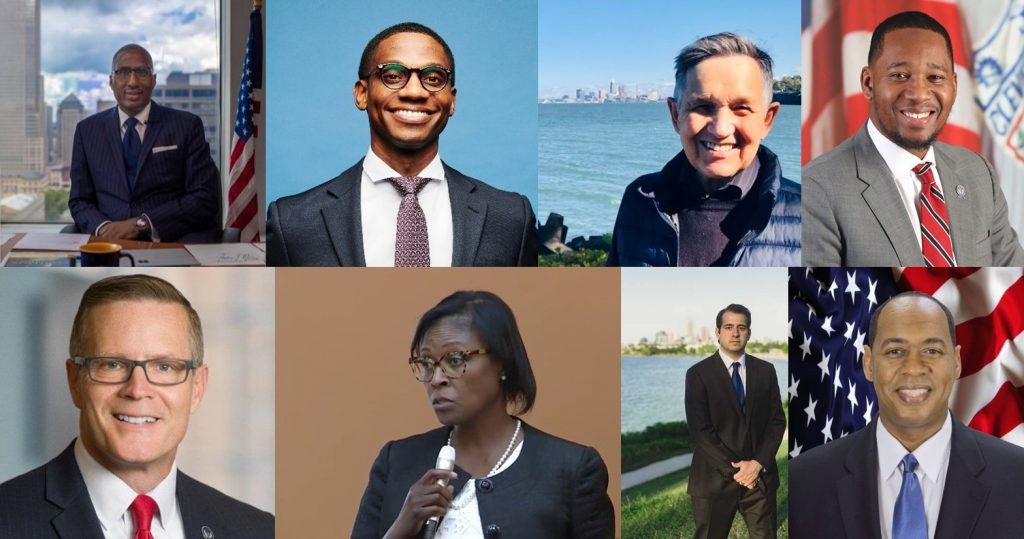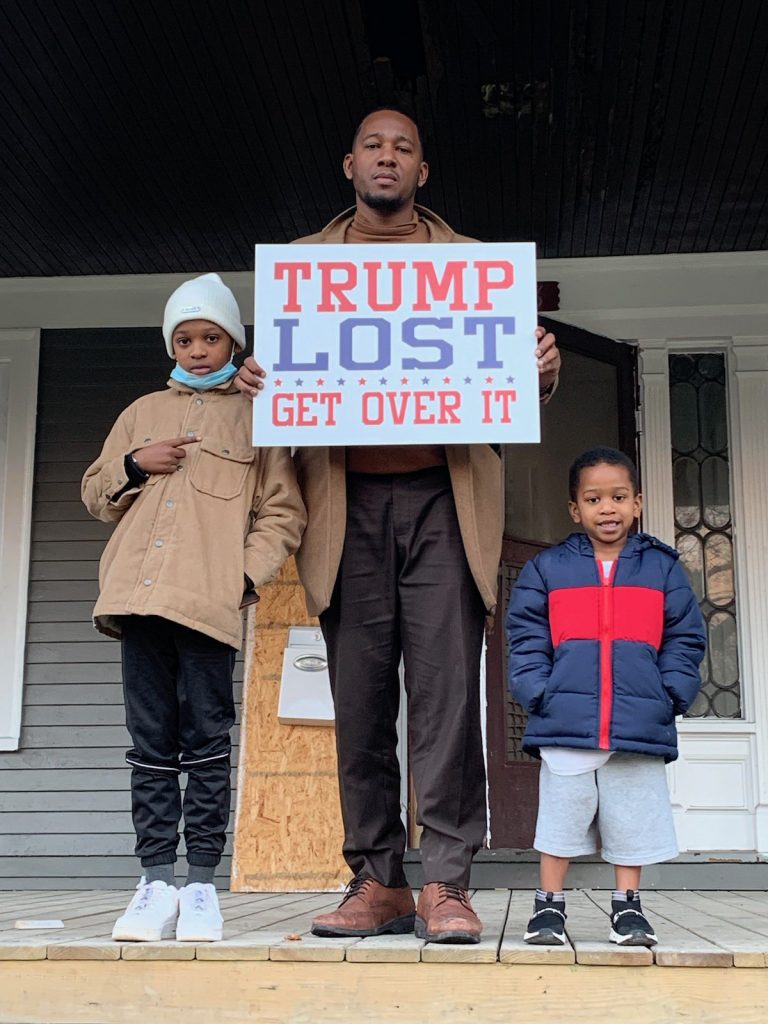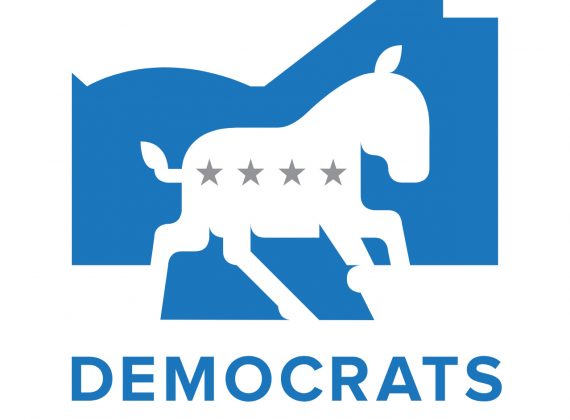
Finally! There will be a new mayor of Cleveland. And we now know it’ll be one of eight people. A varied mix of first-time candidates, long-term electeds, and even one who’s held the job before, seek the top spot in a city facing an array of issues.
Aside from long-term problems of economic decline, demographic hemorrhaging, uninspired leadership, and geographic division, more recent predicaments confront us as a city. After having the Opportunity Corridor’s potential to save the city shoved down our throats by the current administration, we must now actually deal with the logistics of it. Meanwhile, violent crime has skyrocketed in Cleveland as it has elsewhere in America. And, for Christ’s sake, we haven’t had curbside recycling in over a year. These are but a few of the pressing issues the next mayor must confront.
The strategies in terms of where each candidate spends their time and resources, along with how wide a net each will cast over the city will tell the tale of how they think they can make the November 2nd runoff. For example, will the four candidates hailing from the east side seek inroads on the west? And vice versa for the west siders? As the lone east sider never to hold office, Justin Bibb is wisely well underway in that effort. Considering five of the seven biggest wards in terms of last year’s turnout are on the west side, and at this point Ward 17 is the raw vote behemoth of the city, west siders should expect to see a lot of these candidates between now and the September 14th primary. (Previous posts on this site have outlined how the various candidates could win and some obstacles each could face).
In reading some of the comments about the race on social media—the ultimate portal to passive aggressive cynicism in today’s world—I can’t discern how many of the people bemoaning the candidacy of a given candidate, or those lauding the candidacies of others, live in Cleveland, can vote in Cleveland, or will come out from their online hiding spots long enough to engage in the race. Nevertheless, the campaign beats on.
State Senator Sandra Williams is the lone woman running for the office. And, despite the enormous array of obstacles women must face in our male-centric world, this could work in her favor in this particular race. In terms of sheer voting anyway. So while she’ll probably have to endure all the sexism women seeking power always seem to confront, she does have one ace up her sleeve: a large base of potential support that comes from 15 years of representing Cleveland’s east side in the statehouse and now nearly 2/3 of the city itself in the State Senate. In terms of sheer base, hers will probably be the second largest behind only Dennis Kucinich, even if some of those she’s represented live outside city limits.
Quite frankly, Sandra Williams should run a far-reaching campaign. At least geographically speaking. Though she’s held elected office for a decade and a half, she still isn’t well-known to large segments of vote-rich precincts on the west side. Which means she has the potential to capture the attention of a host of constituents in a positive way. This worked well for an east-side State Senator once before in recent memory.
On June 28th, Landry Simmons withdrew from the race. I suppose it’s possible that all of the city’s residents who voted for Donald Trump last year could band together and support Republican Landry Simmons Jr., putting him in the runoff. But I doubt it. Besides, he will not be the only candidate receiving Republican votes. (More on that below). Yet, his emphatic pro-police stance and his position as a County Sheriff will appeal to those worried and disgusted by the current crime increase. A disgust, by the way, that should not be minimized in terms of electoral appeal. But Simmons may get this position co-opted by other candidates.
After finishing second in the most recent mayor’s race, albeit a snoozer that he lost by 20 points, Zack Reed has reason to think voters could give him a second look. And, with 70% name recognition in a recent Baldwin Wallace University poll he has data to back up this belief. But, does that type of name recognition translate to votes? Or have enough people already formulated opinions about Reed? In the meantime, will he be able to get past the continued jokes (whispered and spoken aloud) about his three drunk driving arrests? Reed is a compelling speaker and polished on the stump, but should he make the runoff, depending on who his opponent is, it’s hard to see him either being able to consolidate support on the east side and/or attract enough west side voters to offset any losses from the east side.
If former Congressman Dennis Kucinich runs an even moderately aggressive campaign, with his near-universal name recognition (especially on the west side), and the free and largely positive press coverage from his recent book, it will almost surely lead to the 10,000+ votes he needs to make the runoff en route to reclaiming the office he lost 42 years ago. If he comes across as genuine in his desire to be mayor again, and articulates a broad enough platform, Kucinich will make the runoff.
It’s clear now that he’ll try to use the issue of Muny Light and the poor management of its successor Cleveland Public Power, coupled with FirstEnergy’s nefarious designs on CPP, to burnish his populist, if-not-always progressive, credentials. He clearly aims to use the experience card during the primary in terms of his ability to manage the city’s travails, though his record as an administrator is less than stellar. This gambit will see him walking fine lines on powder keg issues like the police department as he did at his announcement by saying we need more police officers whilst also promising bad ones must go. Dennis will almost certainly point out that not only is he not the favored candidate of corporate Cleveland, but that he is their chief enemy in terms of fighting on behalf of the people. This argument could resonate across large swaths of the city. On the west side, as well as the east.
At the end of the day, he has a large base of supporters still sympathetic to him. And, having seen him up close lately, for anyone who doubts his energy level or intellectual aptitude at the age of 74, Dennis Kucinich is still a dynamo.
For Ward 7 Councilman Basheer Jones to finish third in the recent BW name recognition poll genuinely surprised me and could bode well for him. He’s a mesmerizing speaker and for those Democrats who’ve had enough of the Republican lies about the 2020 election, this picture alone will warm their hearts.

In terms of a genuine base, it would seem Ward 7 is not the ideal launching pad. Given his ward’s anemic turnout last year, and, having won his race in 2017 by 13 votes, it’s probably fair to say Jones doesn’t have the full support of all the ward’s residents. Nevertheless, he has the panache and passion to potentially offset these dynamics, especially when he’s talking about the have-nots in our society, which is why running a broad campaign might behoove him. He could energize enough people about the reasons why politics and government matter in our lives while simultaneously explaining the compelling reasons why he believes in public service in the first place. Basheer Jones remains in my mind the real wild card in this race.

Meanwhile, for the person who has held the second-highest position in the city for seven years to finish fourth in terms of name recognition, behind even a first-term councilmember, could be a harbinger of trouble. To garner only 47% as the leading legislator in the city would be akin to Nancy Pelosi doing the same nationwide. Yet it could also mean that Clevelanders’ views of Council President Kevin Kelley haven’t hardened in any permanently negative manner.
I’ll be very curious to see how Kelley does in his own Ward 13. After winning four elections to his City Council seat, I wonder if it’s because he’s simply a known entity in his ward or if he has legitimately deep pockets of support there; enough for residents to believe he deserves a promotion. Kelley was betting on the fact that Kucinich was either not going to run—dangling the potential of a campaign to boost sales for his new book—or that he will not conduct a vigorous campaign.
Kelley also holds the number two spot in the Cuyahoga County Democratic Party, yet 41% of voters in his ward cast their ballot for Donald Trump last November. Additionally, as the favored candidate of big business, Kelley will by definition seek Republican votes in the primary. To many local progressives, these phenomena are not mutually independent and serve as disqualifying in and of themselves.
Will others make a genuine play for the large pool of votes in Ward 13, which in the 2020 general election finished second in terms of turnout percentage? That is an intriguing question in terms of getting the necessary votes to make the runoff. It seems like Justin Bibb’s boundary-less campaign will do just this. And, Dennis Kucinich could also attract votes in the Old Brooklyn neighborhood should he make a play for them. Only time will tell.
In a recent Plain Dealer analysis of the political dynamics of Kelley confronting Kucinich in the mayor’s race, Brent Larkin surely had one thing right: Kelley will be attacking Kucinich. Something he did the very day Kucinich formally announced with a statement: “This election is about the future. Our city has made great progress in digging out from the dark days of the past. We cannot afford to go back.” But where I disagree with Larkin’s assessment is in the fact that Kelley would be the only, or even primary, beneficiary of that tactic. It’s true that in a one-on-one race successful negative campaigning benefits the person launching those attacks. In a crowded field that isn’t always the case. Other candidates will benefit from any weakening of Kucinich the frontrunner. Indeed, I’d argue Justin Bibb may be the ultimate beneficiary from Kelley’s criticisms of Kucinich. Also, though it goes without saying that racism still exists in America and Cleveland, the idea that people considering voting for Dennis will automatically choose another person jut because he’s white is less likely today than it was 40 or more years. Besides, Dennis will still do relatively well amongst Republicans in the city not because he’s white, though that’s usually a precursor to receiving votes in today’s GOP, but because of his anti-elitist history.
With incumbent Mayor Frank Jackson out of the race, one successful strategy against Kelley might be to lay the array of the city’s problems at his doorstep. After all, he’s led City Council for seven years, been a member for nearly fifteen, and some would claim he’s acted largely as a rubber stamp for the Jackson administration. But, this strategy may not be necessary and could be more applicable should Kelley make the runoff election.
I’m not entirely sure what to make of Ross DiBello’s candidacy. As a person he’s surely likable and intelligent enough to do the job. He’s also gotten better in terms of answering questions. And, he may be able to peel enough voters away in his native Ward 17 to have an impact upon the race. I don’t necessarily join in the chorus of those telling him he should run for some lesser office though. He’s obviously got reasons for running for mayor and the energy it takes to submit petitions with over 5,000 signatures is impressive for a rookie.
In Larkin’s recent article, he lumped Justin Bibb together with Jones, Reed, and Williams to say one of them will likely emerge as the runoff opponent against Kucinich or possibly Kelley. He’s right to say this because they all hail originally from the east side and if all four of them split the east side vote they will need to make inroads somewhere west. I don’t altogether buy this line of thinking though,. The reality is that Bibb is going to perform well in several majority-white wards, including 3, 15, and 17. Indeed, if the election were held today, he would finish no worse than 3rd in terms of west side votes. Thus, he would probably need to finish only fourth at worst on the east side–and I suspect he could do better, and therefore finish second or possibly first overall. On top of that, it’s quite possible that some combination of Bibb, Jones, Williams, and Reed will make the runoff.
When it comes to Bibb himself, I’m not entirely certain when he sleeps. I see him in website articles, in action on social media– his own accounts and others–and even a few times in person. More than any other candidate, Bibb is running a truly citywide campaign. And, along with Jones, he’s laying claim to the existential desire to bring this city together. Beyond any policy specifics, if Bibb can continue reminding people of the reasons why he’s running—his love for the city and a genuinely earnest desire to see it improve and be governed effectively—that will be something people remember and latch onto intellectually as well as emotionally. Those who try fearmongering will have their hands full pitting any cynicism against Bibb’s inherent optimism, which imparts hope amongst the unjaded.
Whichever two candidates emerge from the primary, the election in November will be completely recast. Some candidacies are simply built better for a large field. The potentialities of who could face who are truly intriguing. In a very real way, the general election will set the clocks back to zero as the campaign will start over from scratch, in terms of where they must go for votes. But my sense is that there could be at least three candidates who, should they emerge, will be heavily targeted by a significant, and independent, opposition movement.
LINGERING QUESTIONS
Will there be a coalescing amongst voter groups during the primary? The old conventional wisdom in Cleveland’s previous mayoral races was to view them through the prisms of east-west, black-white, but will that be the case this time? Will the burgeoning progressive movement within the city solidify around one candidate? We already see Kelley lining up union and corporate support (a paradox if ever there was one) but can that lead to enough boots on the ground to get him to the runoff? Whatever happens, can the conventional wisdom be turned upside down?
Can the city’s downward trend in voter turnout be reversed with this race? If a crowd of candidates like those above, though flawed as all humans are, cannot get people off their couch to perform their civic duty, despite Republican attempts to keep Democrats on their couches on Election Day, then we have far more work to do as a society and a citizenry.
In the same vain of thought, how important is name recognition in Cleveland politics? If the electorate remains disengaged, presumably that bodes well for the well-known. But, if this race can awaken a dormant civic pride amongst Clevelanders, then that’s a victory of sorts all by itself.
Though this race is nonpartisan, will any candidate attempt to harness the city’s undeniably Democratic lean and make hay about the Republicans in the statehouse? Or, more broadly the Trumpian Republican party nationally? Or, closer to home, even try to paint other fellow candidates as Republicans in Democratic clothing?
As Ohio gets closer to allowing sports gambling in our state, I figure it may help clarify where I think the race stands with some odds on who will be our next mayor.
Kucinich- 4:1
Williams- 8:1
Bibb- 10:1
Reed- 15:1
Jones- 15:1
Kelley- 20:1
DiBello- 100:1
Simmons- No
1 Comment
Comments are closed.





[…] that we know we’ll have a new mayor and for the first time in seven years a new president of Council as well, the outcome of some of […]